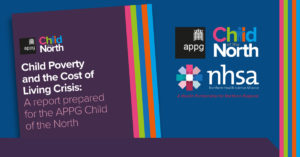Children in the North most vulnerable to cost-of-living crisis
Posted: 24th January 2023
 A new report has warned that children living in the North of England are among the most vulnerable to rising living costs.
A new report has warned that children living in the North of England are among the most vulnerable to rising living costs.
The Child Poverty and the Cost of Living Crisis report from the All-Party Parliamentary Group Child of the North, has found that children in the North are some of the least protected from the current cost of living crisis.
New analysis released on Tuesday 24 January shows that child poverty, including fuel poverty and food insecurity, is higher in the North than the rest of England. For many families the current economic chaos will deepen an enduring child poverty crisis in the region.
We welcome this report as an important step to recognise the importance of timely interventions to prevent further deterioration of the living conditions for vulnerable children and their loved ones. The report shines a light on the inconsistencies in the North of England compared to the rest of the country and resonates with some of the key themes highlighted in our YHealth for Growth campaign. Our YHealth for Growth campaign, in partnership with Yorkshire Universities and NHS Confederation, brings together local and national leaders to better recognise the linkages between health and the economy, with the aim of tackling inequalities and improving life outcomes across the region.
The report found:
- During the pandemic, 34% of children in the North (around 900,000) were living in poverty, compared with 28% in the rest of England. This equates to 160,000 extra children in poverty in the North.
- Before the current crisis, around one million households in the North were fuel poor, proportionally more households than in the rest of England – 15% in the North compared to 12%
- In the North, the standing charge for energy prepayment meter customers in Yorkshire and the North East is higher (at around £3.80 per week) than the UK average (of £3.60 per week)
- 23% of children in England who are food insecure miss out on free school meals
- Families in the North are more likely to be living in poor quality, damp homes. Before living costs started to rise, over 98,500 homes in the North already had some form of damp and 1 million homes in the North failed ‘decent homes’ criteria
The report authors have issued a stark warning to government that rising living costs will lead to immediate and lifelong harms for children: worsening physical and mental health outcomes; undermining children’s learning, social wellbeing and education; and risking lower lifelong health and productivity.
The report was prepared by experts from northern organisations and universities for the APPG Child of the North. The APPG brings together policy makers and experts in child outcomes from across the country to find solutions to the disparities suffered by children in the North of England. The group was launched following the publication of The Child of the North report, produced by the Northern Health Science Alliance (NHSA) and N8 Research Partnership.
A suite of recommendations to government have been laid out by the report authors to ensure families with children have enough money and security of income to meet basic needs, such as healthy food to eat and warm homes.
Some of the recommendations include:
- Increase benefits in line with inflation at the earliest opportunity and commit to ensure that benefits rise in a timely way in line with inflation long-term
- Expand Free School Meals (FSMs) to all children whose families are in receipt of universal credit, as the simplest and most effective way of reaching all children affected by poverty and food insecurity, with an ambition of achieving FSMs for all primary pupils
- Ensure that existing data can be disaggregated by region and that ethnicity is included in all national data collection systems
- Prioritise the development of an integrated health inequalities strategy as part of ‘levelling up’, with an explicit focus on children and addressing child poverty, and including action to ‘poverty-proof’ schools
Read the full report
